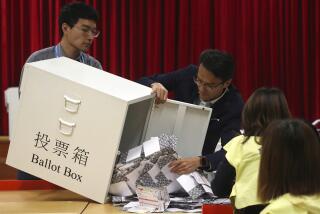Hong Kong Reforms Rejected
- Share via
HONG KONG — China today formally rejected a bid to allow a popular election to choose Hong Kong’s next chief executive in 2007, in a crushing blow to pro-democracy advocates in the territory.
The ruling, announced by Hong Kong’s current chief executive, Tung Chee-hwa, also ended hopes of electing the territory’s 60-member Legislative Council through universal suffrage by 2008. Only half the council members will be elected in that manner in balloting scheduled for later this year.
“According to the decision, there will be no universal suffrage for the chief executive election in 2007, nor will there be for the Legislative Council in 2008,” Tung said at a midday news conference here.
The ruling, issued by the Standing Committee of Beijing’s rubber-stamp National People’s Congress, did declare that the territory could alter the current election system, in which elite groups of carefully chosen residents select the chief executive and half the legislators. However, the Standing Committee stressed that change must be gradual.
There was no immediate elaboration of what reforms might be permitted and how and when they might be implemented.
“These [changes] will be arranged in accordance with an orderly process,” Tung said. “We have to build on our experience. This decision is in the interest of Hong Kong and its long-term prosperity.”
Tung acknowledged that the decision would be unpopular with some constituencies in the territory but appealed for calm.
“I urge people to stay calm and rational and strive for consensus in the development of Hong Kong,” he said.
Although not unexpected, Beijing’s decision came as a terrible disappointment to pro-democracy advocates in Hong Kong, who began campaigning openly for the popular election of the chief executive and legislature in the wake of massive anti-government demonstrations in July.
Christine Loh, a prominent civil rights activist who is among those pushing for change, was as critical of the manner in which Beijing had rejected the goal as the rejection itself.
She argued that, instead of engaging Hong Kong’s various political groups in an open dialogue and then deciding to delay the reform, Beijing had directly intervened in the territory’s affairs, damaging the system under which Hong Kong enjoys limited autonomy.
“They went much further than they needed to,” Loh said. “Of course people are disappointed, but what has really upset them is the manner in which this has been done.”
Beijing did consult with Hong Kong’s leaders on the issue, and even met with democrats for the first time earlier this month. But these meetings occurred only after China’s leaders declared that the Standing Committee alone would decide the timing and pace of democratic reforms in the territory.
Democrats, and some legal experts, believe Hong Kong’s mini-constitution, known as the Basic Law, gives the territory the right to launch and initially shape the reform process without interference from Beijing.
All agree the mainland government has the right to approve any reform prior to its implementation.
The Basic Law sets universal suffrage as an ultimate goal, and the territory’s No. 2 political figure, Chief Secretary Donald Tsang, told reporters that this remains the case.
“It’s all a matter of pacing,” he said.
More to Read
Sign up for Essential California
The most important California stories and recommendations in your inbox every morning.
You may occasionally receive promotional content from the Los Angeles Times.













